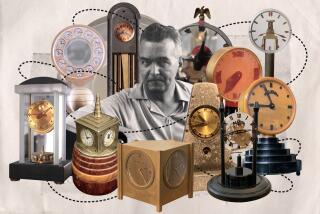Practice Stands the Test of Time
- Share via
In a tiny shop nestled between storefronts along bustling Avenida Del Mar, a dying art is quietly being kept alive.
Surrounded by hundreds of intricate timepieces, interrupted occasionally by the sweet chimes of antique clocks, two craftsmen from the tiny country of Macedonia patiently and expertly practice the old-world skill of clock and watch restoration.
“It’s a dying art,” said 23-year-old Vladimir Stojkoski, who, with his 55-year-old father, Metodija, runs the Del Mar Watch and Clock Shoppe. “Not a lot of people want to do this anymore.”
From a 16th century German clock to streamlined $20,000 solid-gold watches to Russian timepieces, the father-son team is sought out from as far away as San Francisco by antiques dealers because of their expertise in repairing timepieces from all makes and eras. While the elder Stojkoski quietly works on watches, his son restores clocks.
“They’re excellent,” said 47-year-old Paul E. Gabriel, a Los Angeles antiques dealer who commutes weekly to the Stojkoskis’ shop for repairs and to seek advice on his timepieces, which he has been collecting for 25 years. “They’re real experts on everything. They had opportunities to work on things that we don’t have over here. That’s something that someone like me only dreams about.”
Vladimir Stojkoski grew up in Macedonia, once a republic of the former, war-torn Yugoslavia, where he first learned the craft of repairing clocks from his father.
“I used to play with my father’s old alarm clocks,” Vladimir Stojkoski said. “He’d toss them my way and I’d break them. Then one day he said, ‘You’ve taken them all apart; now put them all back together.’ ”
The younger Stojkoski is the fourth generation in his family to learn the skill.
When Vladimir Stojkoski turned 14, his family decided to leave their homeland and move to the United States for better opportunities. They ended up settling in San Clemente in 1989 with the hope of someday returning to Macedonia, until the war between Bosnia and Croatia broke out in 1991.
“They wanted to see us succeed here and then go back and retire,” said Vladimir Stojkoski of his parents, Metodija and Marija. “But now with the war, it’s kind of hard to do that.”
Vladimir admits that his parents miss Macedonia, but in the meantime, he said, they have found a home where they can practice a family tradition.
More to Read
Sign up for The Wild
We’ll help you find the best places to hike, bike and run, as well as the perfect silent spots for meditation and yoga.
You may occasionally receive promotional content from the Los Angeles Times.






